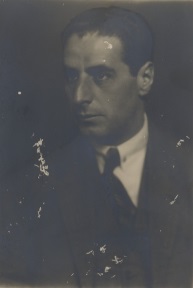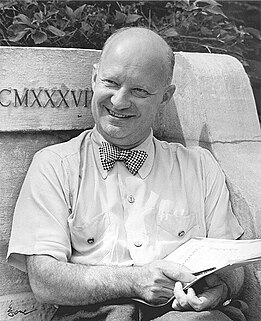Related Research Articles
Mark-Anthony Turnage CBE is an English composer of classical music.

Sofia Asgatovna Gubaidulina is a Soviet-Russian composer and an established international figure. Major orchestras around the world have commissioned and performed her works. She is considered one of the foremost Russian composers of the second half of the 20th century.

Ernst Toch was an Austrian composer of classical music and film scores. He sought throughout his life to introduce new approaches to music.

Geoffrey Alan Burgon was a British composer best known for his television and film scores. Among his most recognisable works are Monty Python's Life of Brian for film, and Tinker Tailor Soldier Spy and Brideshead Revisited for television, the latter two earning Ivor Novello Awards in 1979 and 1981 respectively. He also won BAFTAs for his themes for the remake of The Forsyte Saga and Longitude.
Chen Yi is a Chinese-American violinist and composer of contemporary classical music. She was the first Chinese woman to receive a Master of Arts (M.A.) in music composition from the Central Conservatory of Music in Beijing. Chen was a finalist for the 2006 Pulitzer Prize for Music for her composition Si Ji, and has received awards from the Koussevistky Music Foundation and American Academy of Arts and Letters, as well as fellowships from the Guggenheim Foundation and the National Endowment for the Arts. In 2010, she was awarded an Honorary Doctorate from The New School and in 2012, she was awarded the Brock Commission from the American Choral Directors Association. She was elected to the American Academy of Arts and Letters in 2019.

Sir John Blackwood McEwen was a Scottish classical composer and educator. He was professor of harmony and composition at the Royal Academy of Music, London, from 1898 to 1924, and principal from 1924 to 1936. He was a prolific composer, but made few efforts to bring his music to the notice of the general public.
Nigel Keay is a New Zealand composer. He has been a freelance musician since 1983 working as a composer, violist, and violin teacher. Nigel Keay has held the following composer residencies: Mozart Fellowship, University of Otago 1986 and 1987, Nelson School of Music 1988 and 89, Auckland Philharmonia Orchestra 1995.
Antonín Dvořák's Serenade for Strings in E major, Op. 22 (B. 52), is one of the composer's most popular orchestral works. It was composed in just two weeks in May 1875.
Marjan Mozetich is a Canadian composer. Mozetich has written music for theatre, film and dance, as well as many symphonic works, chamber music, and solo pieces. He has also written compulsory competition pieces for the 1992 Banff String Quartet Competition and the 1995 Montreal International Music Competition. Co-founder of Arraymusic in Toronto, Mozetich served as their artistic director from 1976 to 1978. After his work with Array, he worked for some time at the University of Toronto music library, and he then became a freelance composer. Mozetich moved to Howe Island, near Kingston, Ontario, and has taught composition at Queen's University in Kingston, Ontario from 1991 to 2010. He has won several awards, including the first prize in the CAPAC (SOCAN)-Sir Ernest MacMillan Award. His major compositions include Fantasia... sul linguaggio perduto, and Postcards from the Sky.
Matthew John Hindson AM is an Australian composer.

Donald Henry Kay AM is an Australian classical composer.
Cecilia McDowall is a British composer, best known for her choral music.
L'arbre des songes is a violin concerto written by Henri Dutilleux between 1983 and 1985. It is dedicated to Isaac Stern.

Gideon Gee-Bum Kim is a Korean-Canadian classical music composer, conductor, and music educator and founder of the Toronto Messiaen Ensemble. His music draws on his Christian faith and shows a connection of the rich musical heritage of Korea and new compositional techniques, especially in the field of heterophony texture and all of this with live and emotional imagination.

Keqrops is a composition for piano and orchestra by Greek/French composer Iannis Xenakis. Due to the prominent role of the piano soloist, it has often been classified as a piano concerto. It was completed in 1986.

The Triumph of Time, sometimes also referred to as Triumph of Time, is a composition for orchestra by British composer Harrison Birtwistle written 1971 and 1972. It is one of Birtwistle's best-known compositions, as well as one of the works that earned him international reputation.

Die Harmonie der Welt Symphony, IPH 50, is a symphony by German composer Paul Hindemith composed in 1951, which served as the basis for his opera Die Harmonie der Welt.
Your Rockaby is a concerto for soprano saxophone and orchestra written by British composer Mark-Anthony Turnage. It was completed in 1993.
Dispelling the Fears is a double concerto for two trumpets and orchestra by the British composer Mark-Anthony Turnage. It was composed in 1993 and 1994.
References
- ↑ Simeone, Nigel (2015). Liner Notes of Decca 4788356. Baarn: Decca.
- ↑ Guides, Rough (2010). The Rough Guide to Classical Music. Rough Guides UK. p. 589. ISBN 978-1-84836-677-0 . Retrieved 6 June 2020.
- ↑ Education, Rhinegold (2017). Eduqas AS and A Level Music Study Guide. Rhinegold Education. ISBN 978-1-78323-891-0 . Retrieved 6 June 2020.
- 1 2 Turnage, Mark-Anthony (1987). Night Dances, for orchestra. London: Schott Music. p. 70. Retrieved 6 June 2020.